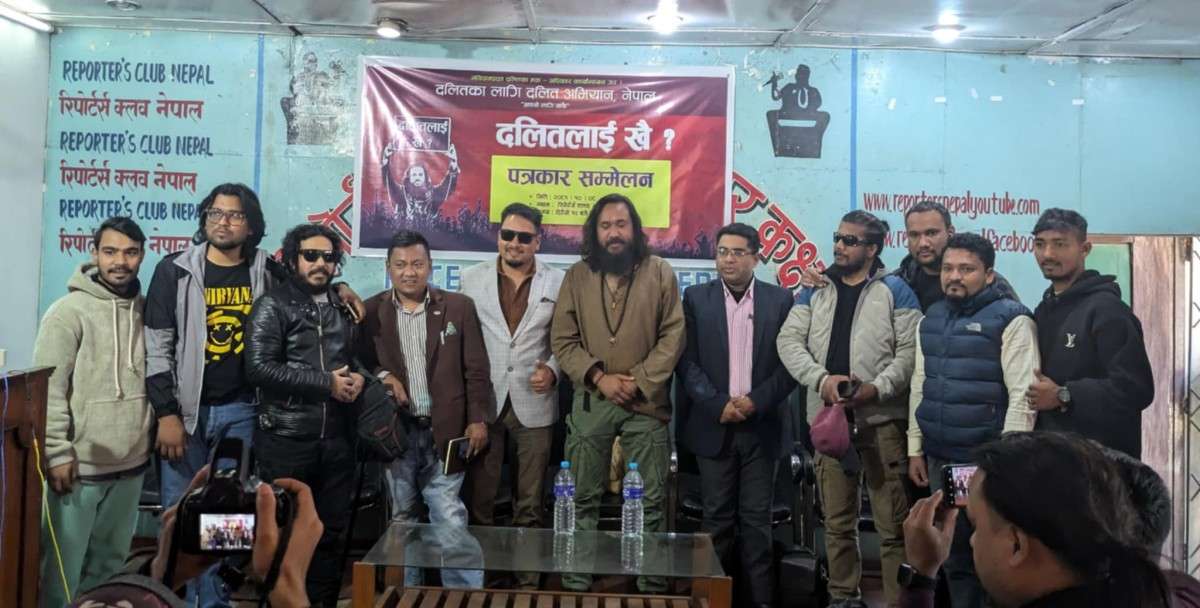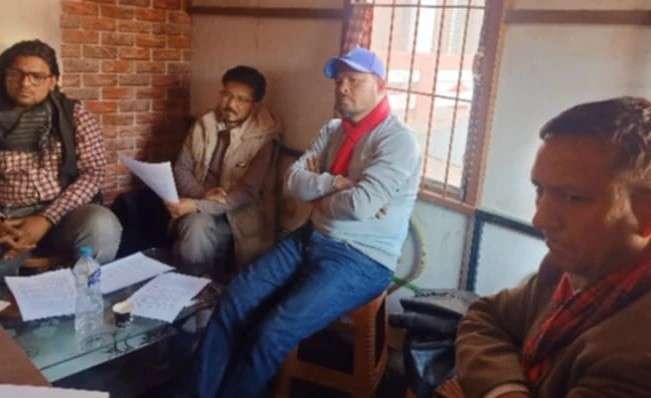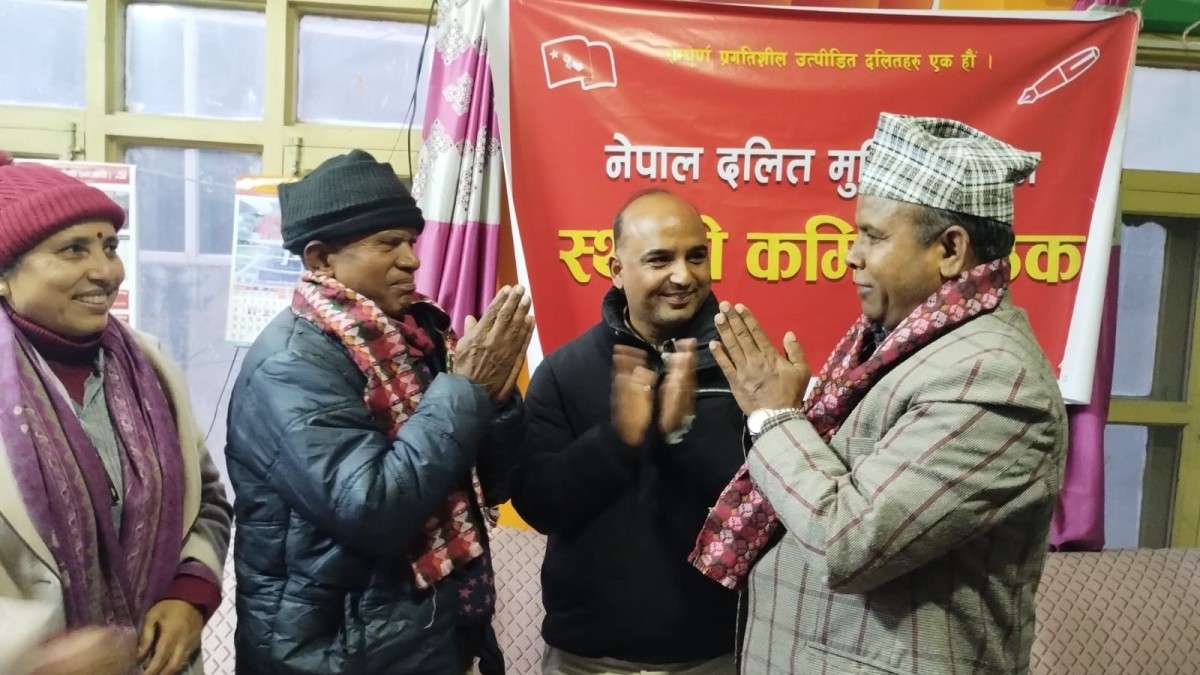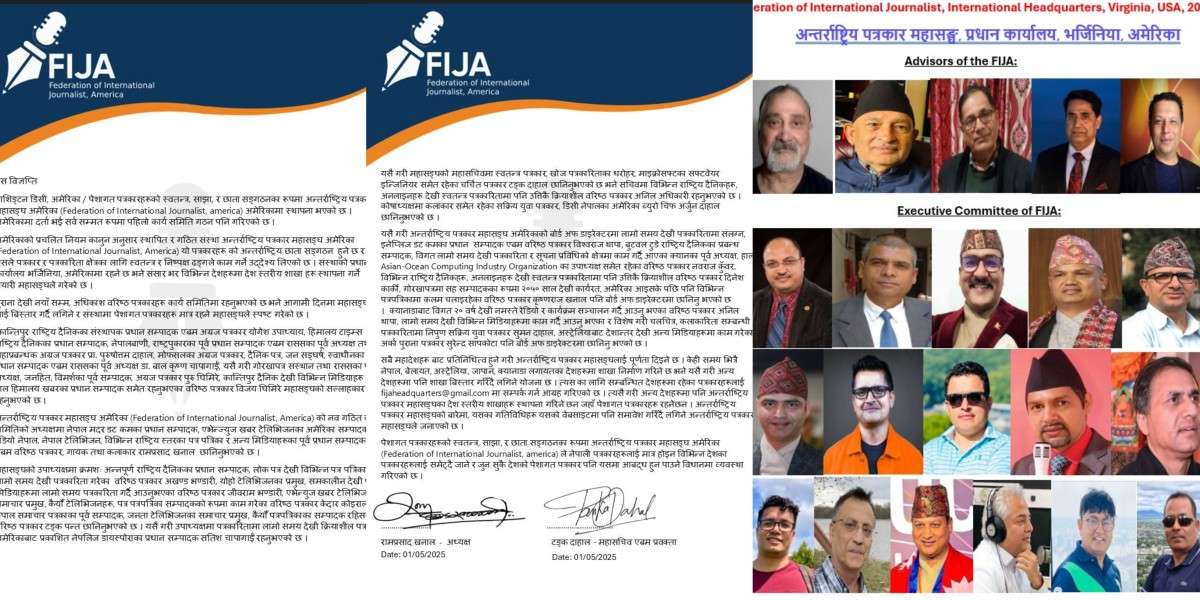International Day for Disaster Risk Reduction 2023 Celebrated
- Dignity Post
- 16-10-2023 11:49

National Platform for Disaster Risk Reduction (NPDRR) organized an International Day for Disaster Risk Reduction,
On October 13, 2023, the National Platform for Disaster Risk Reduction (NPDRR) organized an International Day for Disaster Risk Reduction, focusing on supporting People with Disabilities (PwD) in disaster situations. The event centered around the theme 'Fighting inequality for a resilient future,' stressing the importance of involving PWD in disaster planning and response. The event was a hybrid of in-person and virtual attendance, with 107 individuals present physically and an additional 130 joining via Zoom, some participants also joined through live Facebook broadcast. The aim was to highlight the unique challenges PwD face during various disasters.
The opening session was chaired by Mr. Jay Narayan Acharya Joint Secretary of NDRRMA, with the Deputy Prime Minister and Home Minister, Hon. Narayan Kaji Shrestha, gracing the event as the Chief Guest, among other notable attendees. Hon. Shrestha acknowledged the critical importance of the event and emphasized that our society’s preparedness level plays a crucial role in determining how severely disasters impact us. He highlighted the government's commitment to enhancing its predictive weather capabilities and shared the ongoing efforts to establish an earthquake early warning system in Western Nepal, reflecting on the recent Bajhang earthquake.
In the latter part of the program, a technical session was conducted where organizations that work for PWD were trained on how to gather and input crucial data into the Bipad portal. This step is pivotal in ensuring collaboration with local governments, aiming to facilitate a system that ensures the needs and challenges faced by PWD are addressed efficiently during calamitous events. The underlying ambition of this initiative is to pave a path where every individual, especially those with disabilities, is safeguarded and supported during crises.
News in Details:
On October 13, 2023, NPDRR organized the International Day for Disaster Risk Reduction (IDDRR Day) with the theme 'Fighting inequality for a resilient future ' in support of AIN, DPNet and DCA Nepal. The event was conducted in a hybrid format, with 107 individuals attending in person and 130 participating through the Zoom platform. Additionally, the program was streamed live on Facebook. The program was dedicated to recognizing the increased vulnerability of People with Disabilities during disasters. With the practice of IDDRA Day celebration since 1989, this year's event aims to address the specific challenges faced by individuals with disabilities in the context of disasters. The mission of the event was to advocate for a resilient future by addressing the inequalities faced by People with Disabilities, with the goal of bringing this often marginalized segment of our society into the spotlight and ensuring their comprehensive inclusion in relevant policies, plans, and structures.
The opening session was chaired by Mr. Jay Narayan Acharya, Joint Secretary of the National Disaster Risk Reduction and Management Authority (NDRRMA), with Hon. Narayan Kaji Shrestha, Deputy Prime Minister, and Home Minister as the Chief Guest. Notable attendees at the event included Dr. Raju Thapa, Member Secretary of the National Platform for Disaster Risk Reduction (NPDRR) and Acting Chair of Disaster Preparedness Network (DPNet); Dr. Birendra Raj Pokharel, Advisor of the National Federation of the Disabled-Nepal (NFDN); and Ms. Samjana Bista, Country Director of DCA Nepal. The program was then followed by the National Anthem.
In his address, Deputy Prime Minister and Minister of Home Affairs, Hon. Narayan Kaji Shrestha, conveyed his appreciation for the organization of the program, which places persons with disabilities at the heart of our disaster-related efforts on the occasion of the International Day for Disaster Risk Reduction. He praised the program for not only strengthening our society's preparedness for disasters but also for its potential to effectively raise awareness about disaster risks faced by the most vulnerable citizens. Hon. Minister highlighted the increasing challenge of disasters to our human and developmental progress, attributing their heightened frequency to inadequate preparedness, developmental unpreparedness, and shortcomings. He emphasized that it is our ability to respond and manage these events that determine whether they become disasters, underscoring the importance of managing human activities that contribute to disaster likelihood. The government of Nepal, he stated, is dedicated to improving weather forecasting. Recalling the recent Bajhang earthquake he mentioned that efforts are underway to establish an earthquake early warning system in Western Nepal. While natural disasters cannot be prevented, he stressed the importance of our capability to effectively respond and mitigate them. Furthermore, Hon. Shrestha noted that disasters are not isolated incidents; they are intertwined with our activities and structures. The more our activities compete and resist one another, the greater the likelihood of disasters occurring. Hence, it is imperative to make preparations, work on response strategies, and render our social, economic, and human activities disaster-resilient. Hon. Shrestha emphasized the rights of persons with disabilities to access information, disaster risk forecasting systems, and information delivery systems tailored to their capacities. He shows the importance of Disability Inclusive Disaster Risk Reduction in Nepal. He called for the active involvement of all stakeholders, including the National Federation of the Disabled, in the technical session, expressing confidence in the collaborative effort to devise a practical system addressing barriers faced by persons with disabilities.
Mr. Jaya Narayan Acharya, Program Chair, began his remarks by highlighting the Bipad portal, its functions, and its significance. He stressed that humanitarian concerns hold greater importance than physical materials, particularly when addressing profound disabilities where the need is more comprehensive. Mr. Acharya acknowledged the disparities among various vulnerable groups when it comes to accessing information. These disparities are dependent on the type of disability and the level of vulnerability. He discussed existing provisions aimed at ensuring that people with disabilities have access to the information they need. Various channels for information dissemination have been established to uphold the right to information for people with disabilities. Identifying and understanding the required materials is relatively straightforward, but reaching disabled individuals in crisis situations can be challenging. The Bipad portal has been developed as a valuable resource to distinguish between different types of disasters and their occurrences, addressing various aspects. Mr. Acharya highlighted their efforts to provide information through diverse channels, catering to the needs of individuals with disabilities of varying natures to ensure accessibility. Maintaining records of basic data, such as telephone details and addresses, is seen as crucial for facilitating access to their situations and conditions during emergencies. He stressed the importance of collaboration between the government and organizations of persons with disabilities as a network, working together to address the challenges faced by people with disabilities and reduce their vulnerability during disasters.
Dr. Raju Thapa, Member Secretary of NPDRR and Acting Chair of DPNet, during the context setting of the program, explained that Nepal has been celebrating International Disaster Risk Reduction Day since 1989, celebrated every year on October 13th with a range of programs aimed at raising awareness about disaster-related issues and fostering a culture of disaster risk reduction. Dr. Thapa emphasized that from 2015 onwards, following the implementation of the Sendai Framework for Disaster Risk Reduction (SFDRR), this day was officially recognized and observed until 2022, focusing on the seven global targets outlined in the SFDRR. In 2023, there is a heightened awareness of the significant impact of disasters on marginalized and vulnerable individuals. Dr. Thapa emphasized that despite ongoing recovery efforts, this year is dedicated to centralizing the fight against inequality to enhance resilience. This day is now celebrated worldwide to promote awareness about disaster risk reduction. Each year, various programs are organized under the banner of the NPDRR. This platform plays an active role in the field of disaster risk reduction. Initially, it was led by the Home Secretary later by the Executive Chief of NDRRMA. In 2019, a guideline framework for the platform was formulated, with DPNet serving as the member secretariat. The NPDRR encompasses nine thematic areas. It follows an inclusive approach, coordinating Nepal's significant involvement in national, regional, and international programs. As a result, this year's program focuses on activities in marginalized areas, regions, geography, and challenging situations. It's worth noting that individuals with disabilities are disproportionately affected by disasters and are often left behind. Hence, this year's emphasis is on persons with disability-centric activities. Drawing from the example of India, which formulated the Disability Inclusive Disaster Risk Reduction Policy in 2019, with the Prime Minister's special attention, Nepal aims to take similar steps to support individuals with disabilities. In previous years, the day was marked with various programs like awareness campaigns and rallies in Nepal. However, in 2023, the focus shifts towards providing essential information and extensive training to people with disabilities. It's essential to highlight that the program has been designed to be accessible to individuals with disabilities. The program's design is under the guidance of the Executive Chief of the NDRRMA, Joint Secretary Jay Narayan Acharya. Dr. Thapa expressed gratitude to all supporting agencies for their contributions that have made this program possible.
Ms. Samjhana Bista, Country Director of DCA Nepal, expressed her gratitude to all the participants at the event. She acknowledged the collaborative efforts of NDRRMA, NPDRR DPNet, and AIN, which were instrumental in making the IDDRR event possible. She also appreciated the presence of the Deputy Prime Minister and Home Minister. Ms. Bista recognized the significant achievements in disaster risk reduction, thanks to partnerships with various sectors, including governmental and non-governmental organizations. She highlighted the substantial progress made in reducing disaster risks over time. She emphasized that their ability to promote innovative thinking and concerted efforts remains unremitting. Ms. Bista assured that collaborative initiatives, including data collection on vulnerable households and persons with disabilities, would persist, despite the numerous disasters and pandemic challenges that Nepal has faced. She extended her best wishes for future collaborations, underscoring the critical importance of addressing the needs of the most vulnerable groups during disasters, including women, senior citizens, children, and persons with disabilities.
Dr. Birendra Raj Pokharel, Advisor of NFDN, focused on the primary objective of IDDRR Day, which is to reduce inequalities and promote a resilient future. He extended concern beyond disabilities, encompassing factors like the intersection of disabilities with poverty. Dr. Pokharel clarified various types and characteristics of disabilities. Dr. Pokharel emphasized the necessity of effective communication strategies for individuals with mental disabilities, particularly during the rescue and post-disaster phases. Dr. Pokharel acknowledged that the SFDRR emphasizes the importance of addressing persons with disabilities throughout the disaster cycle. He also referred to Article 26 of the Convention on the Rights of Persons with Disabilities, which aims to enable individuals with disabilities to achieve maximum independence and full inclusion in all aspects of life. He noted relevant legislation such as the Natural Calamity (Relief) Act of 2039 B.S. and the DRRM Act of 2074, which address disability-related issues. However, he stressed that people with disabilities should hold leadership roles, and the government should prioritize efforts to address these issues. Furthermore, Dr. Pokharel emphasized that the risks faced by people with disabilities are not limited to natural disasters; they are also vulnerable to various significant threats in human-induced disasters, as exemplified by recent events in Israel. He highlighted the importance of achieving Sustainable Development Goal No. 10, which aims to reduce inequalities, and he pointed out that Nepal's successful transition to a developing country by 2026 hinges on achieving equality, thus facilitating inclusive development.
Mr. Santosh KC, General Secretary of the National Federation of the Deaf Nepal – NDFN, called for close collaboration with the government to address the multifaceted challenges that persons with disabilities encounter. He articulated several critical issues that deserve our collective attention, including problems related to segregation, the imperative need for secure accommodations during disasters, as well as access to medicine, treatment, and various essential services. Mr. KC highlighted that the absence of timely information exacerbates these complications, causing persons with disabilities to fall behind in various aspects of life. He pointed out that even awareness programs, including those on television, lack disability-friendly technology and systems, which can hinder access to crucial information. In emergency situations, persons with disabilities often find themselves excluded from receiving pre-information and encounter difficulties during aid distribution. Therefore, it is vital that policy and regulatory frameworks comprehensively incorporate persons with disabilities concerns, with all three tiers of government ensuring that necessary facilities are provided. Furthermore, Mr. KC stressed the need for early warning systems to be made disability-friendly to guarantee inclusive safety for all.
Mr. Kiran Shilpakar, President of the National Association of the Physical Disabled-Nepal (NAPD Nepal), shared his personal experiences, particularly recalling the challenging times during the devastating earthquake of 2015. He reflected on the extensive efforts undertaken by his team, particularly in distribution and orientation, aimed at providing assistance and support to those in need. With the onset of the COVID-19 pandemic, their work extended to include food and aid distribution, where they encountered unique challenges and opportunities. Mr. Shilpakar expressed gratitude to the Atullya Foundation for their support and collaboration in these endeavors. However, he pointed out that despite food aid distribution efforts, there still exist substantial challenges in ensuring that persons with disabilities can access these vital resources. Furthermore, persons with disabilities often lack timely information about aid distribution, leaving them at a disadvantage. Mr. Shilpakar also emphasized the need for enhanced orientation, especially concerning the SFDRR, to better address the distinct challenges faced by persons with disabilities and ensure that they receive the support and resources they require.
Ms. Nirmala Dhital, Chairperson of the Federation of Women with Disability-Nepal (FWDN), shed light on the critical challenges faced by persons with disabilities during disasters. She emphasized that persons with disabilities, particularly women and pregnant women, are among the most severely affected by disasters and need special attention and support. Ms. Dhital noted that disaster management efforts often focus on humanitarian losses and incorporate various sectors, but they tend to overlook the specific and cross-cutting issues faced by disabled women. She stressed the importance of recognizing the diversity within the group of persons with disabilities and addressing their unique needs and concerns. Among the challenges highlighted by Ms. Dhital were issues related to both pre and post-disaster phases, the need for more effective early warning systems, technological barriers that hinder access and inclusion, discriminatory policies and regulations, the necessity of trained personnel and research for aid, gender-based violence, reproductive health concerns, access to various social security schemes, capacity building, the instability of government structures, and the cumbersome procedures within governmental legislation, among others.
Mr. Rajendra Kandel, Under Secretary, Ministry of Land Management, Cooperatives, and Poverty Alleviation recognized the commendable objective of IDDRR Day and highlighted the concern of safeguarding the most vulnerable groups. He emphasized that the IDDRR theme is closely related to the Ministry of Land Management, Cooperatives, and Poverty Alleviation. While poverty data indicates a decreasing trend, inequality still remains a prevalent issue. Nepal’s Gini coefficient, which stands at 0.31, serves as an indicator of the disparities between the rich and the poor within the country. Ministry of Land Management, Cooperatives, and Poverty Alleviation along with government is actively engaged in combating poverty by ensuring the establishment of social security funds at both provincial and local levels. In 26 districts at the local level, Poor household identification surveys have already been identified and 391831 families have been identified and the process of distributing identity cards is going on. For the remaining 23 districts, data has already been collected, and after data entry is completed, evaluation certificates will be distributed. Mr. Kandel strongly emphasized the urgent need for solidarity in addressing these issues.
Mr. Dhruba Bahadur Khadka, Spokesperson and Under Secretary at NDRRMA, commenced the event with a warm welcome to distinguished guests and participants. He then cited a message from Mr. António Guterres, the UN Secretary-General, in observance of the International Day for Disaster Risk Reduction that acknowledged the extraordinary challenges of 2023, marked by extreme weather events, record temperatures, and a rising number of global disasters, all exacerbated by poverty and inequality. He stressed that marginalized communities are particularly vulnerable to such disasters due to their susceptibility to flooding, drought, and limited resources for recovery. The day's theme, "Fighting inequality for a resilient future," underscored the importance of upholding global agreements like the Paris Agreement, pursuing the Sustainable Development Goals, and implementing the SFDRR to break the cycle of poverty and disaster. Mr. Khadka then emphasized the paramount importance of safety for all, emphasizing that true security cannot exist if even one person is not safe. He pointed out the significant population living below the poverty line and highlighted the prevalence of discrimination based on factors like caste, class, and gender, as well as individual and geographic disparities. He referred to the national demographic report, which revealed vulnerable groups, with a particular focus on senior citizens, and identified regions like Kalikot with high level of vulnerability. Furthermore, Mr. Khadka discussed the Gender Equality, Disabilities, and Social Inclusion (GEDSI) concept and elaborated on their ongoing efforts to develop an early warning system that caters to people with disabilities. He also mentioned specific initiatives like the BIPAD portal and the VMS system, while stressing their commitment to addressing resource inequalities across the country.
Mr. Nil Kantha Paudel, Central President at the National Disabled Research & Development Center, expressed gratitude for the relevant and necessary programs conducted on this occasion. However, he also pointed out that despite having acts and regulations in place, there is still a significant gap in their implementation. Mr. Paudel emphasized a crucial issue: when a disaster results in physical damage, security forces promptly respond. Yet, when people with disabilities reside in affected houses, there is often no one to assist them. He stressed the need for a specialized unit within the security sector that can immediately reach out to help persons with disabilities. Additionally, he called for the development of a mobile app and system that would enable swift response and alert notifications. He expressed that facilities focusing on persons with disabilities should not be limited to urban areas but should extend to remote regions as well. Mr. Paudel also advocated for the meaningful participation of persons with disabilities within disaster committees, highlighting the importance of their active involvement in decision-making processes. He mentioned that when people with disabilities are involved in aid distribution, it can send a positive message both within government bodies and the community, fostering inclusivity and awareness.
Mr. Lakpa Sherpa, Society of Deafblind Parents Nepal expressed his gratitude to all the individuals, groups, organizations, and Civil Society Organizations that have been dedicated to working in the field of persons with disability. He also extended his appreciation to the government for acknowledging the importance of addressing the needs of persons with disabilities. He pointed out that persons with disabilities are vulnerable not only during disasters but also in regular circumstances. He discussed ten different types of disabilities. He stressed the importance of recognizing the specific requirements related to this type of disability and emphasized the need for the development of regulations and policies based on these requirements to address the needs of persons with disabilities but also encompass other intersecting issues, such as poverty and single-parent families, which are highly vulnerable. He underscored the vital role of security forces responsible for rescue operations during disasters. He emphasized the necessity of having trained professionals to handle persons with disabilities during disaster relief and rescue operations. He also advocates for the need for proper documentation about persons with disabilities at the ward level, enabling prompt outreach to their families.
Mr. Raju Basnet, Parents Federation of Persons with Intellectual Disabilities Nepal (PFPID), emphasized that issues concerning individuals with disabilities encompass a wide range of aspects, including disabilities in general, overall risks, intellectual disabilities, autism, and specific challenges faced by those with intellectual disabilities. Referring to a recent earthquake event in Bajhang, he highlighted the critical need for improved accessibility and approachability of information for all individuals with disabilities, as this is often lacking. He pointed out that guidelines, acts, and laws are often laden with jargon and lack simplicity, which can hinder effective communication. Mr. Basnet also mentioned that individuals with disabilities encounter practical challenges, such as difficulties using sanitizers or wearing masks, which can present unique obstacles. Additionally, he addressed the issue of shelter, noting that displacing individuals with disabilities from their familiar environments can be an extremely challenging experience for them.
Mr. Bal Krishna Gaire, National Association of the Physically Disabled Nepal highlighted the importance of disability mapping, emphasizing that without a clear understanding of where and under what circumstances individuals with disabilities are located, it is challenging to identify how to effectively respond and react to their needs in times of crisis. Mr. Gaire also addressed prioritizing individuals with disabilities during rescue operations. He stressed the need for a well-defined plan on how to give them the necessary attention and assistance during these critical moments. He mentioned the distribution of aid, health services, food provisions, training for rescue teams, and the role of the media in disseminating important information and raising awareness. Mr. Gaire concluded by emphasizing the journey from rescue to reconstruction and the need to build resilience within the disability community, ensuring they are not left behind in the process of recovery and rebuilding.
Source: Dpnet Nepal











Conversation